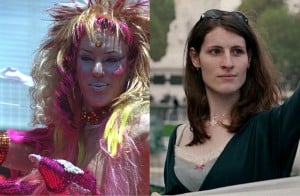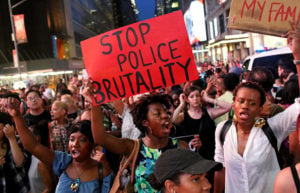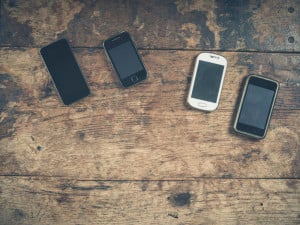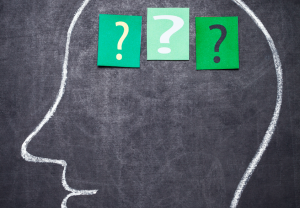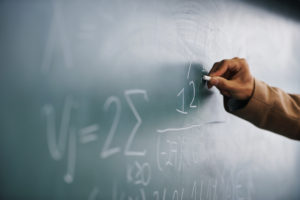
A person writing a formula on a blackboard.
This article was originally published on MsAfropolitan and has been republished with the author’s permission.
Sometimes one is fortunate to find money in an old purse or pocket. For example, such was the case the other day when I put on a jacket I hadn’t worn in a while and stuck my hand into the pocket. Alongside a favorite lipstick — whose whereabouts I’d pondered more than one should ponder the whereabouts of a lipstick — and an old shopping list with my dear late mother’s handwriting, the pocket’s contents included yet another treasure, namely a £20 note.
Well, referring to the £20 note as a treasure might be an exaggeration, especially considering that I spent somewhere around the region of £15 of that money on a single drink at an unjustifiably expensive restaurant later that evening, to which I shall not be returning, with the remaining £5 going toward a fractional component of the meal.
I recall, on the other hand, having the equivalent 10,000 Naira in my purse as I checked into Murtala Mohammed Airport last month. I decided to spend the money before embarking my flight to London, not because I would not be returning to Lagos soon, but because I had happened across two things that I have a penchant for, namely books and plantain chips.
I bought three containers of plantain chips and three books including president Obasanjo’s “Women of Virtue,” which I promptly regretted purchasing as soon as I started reading it on the plane. Anyway, respectability politics notwithstanding (how could I not glean from the title that the book would make all number of dogmatic judgments on what makes a woman a virtuous member of her society?), I was pleased with how I’d spent my money.
Of course, there are other ways I could have spent the £20 and I’m sure that there are bars in Lagos where drinks cost in the region of 5–10k. But the point I wish to make is that although the £20 and the 10, 000 Naira are more or less equal in value, they did not result in identical products.
Speaking of money, then, if I received a penny every time someone dismisses feminism because they argue women and men “can never be equal” since women and men “are not the same,” I would be the owner of a penthouse flat in Eko Atlantic.
Yet, despite its popularity, the error in this argument should be evident to anyone who went to primary school, as it was in such institutions that most of us were taught, that equal means ‘equal’ and not ‘the same’.
However, I’ll refresh our memories and simultaneously show how mathematics can help clarify exactly what we feminists mean by equality.
In math, equality signifies that two entities have the same value. For instance, x might be equal to y (x = y). Right? OK.
To complicate things a little, the entities might themselves be more intricate BUT still equal.
Take for example, (3 + 2) = (7–2). Last but not least, you could also reverse the equations as follows: y = x or (7–2) = (3 + 2); but the equality of the entities would remain.
The equal sign is, therefore, a relational symbol.
Unlike plus, minus, multiply etc. which are associated with actions and gradings, the equal sign only communicates a relationship between entities and one of equal value.
In other words, it does not communicate that an entity is greater, lesser, weaker, stronger, or anything of that nature. Certainly, it does not insist that the entities must be clones.
Let’s repeat that: equality does not necessarily mean sameness, it means the same value.
Of course, equality is not only mathematical, it is also cultural and psychological. In Nigeria, women and men do not have the same value according to the law. But even in countries where the law grants the genders equal rights, such as the Scandinavian nations, women and men still do not necessarily enjoy their equal status due to cultural denigration.
But, to make a pun, let’s go back to square one. And let us remember what most have us have already been taught as five-year-olds.
[do_widget id=’text-101′]
Search our 3000+ articles!
Read our articles about:
Our online racial justice training
Used by hundreds of universities, non-profits, and businesses.
Click to learn more











